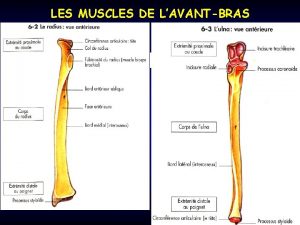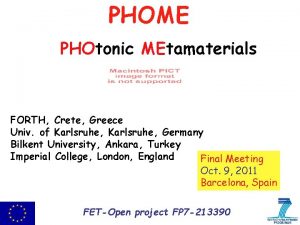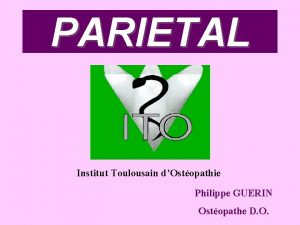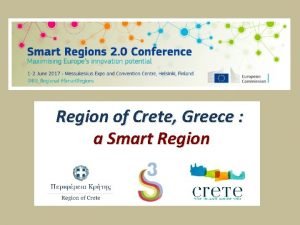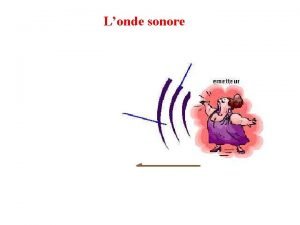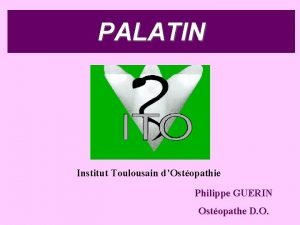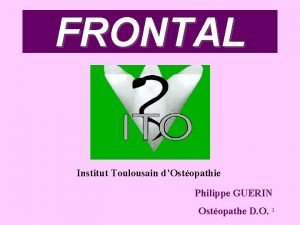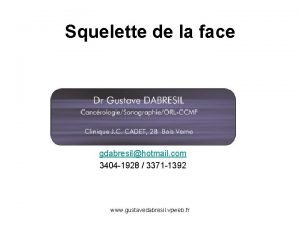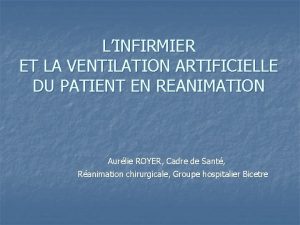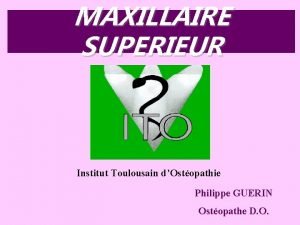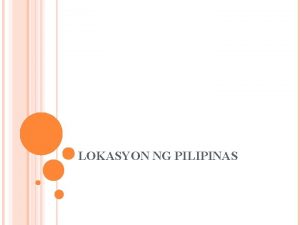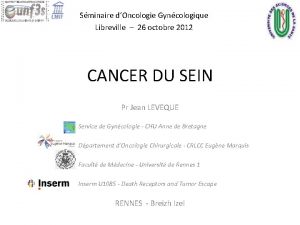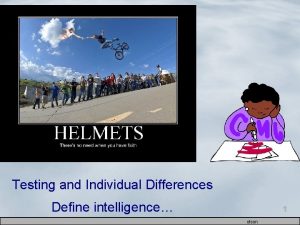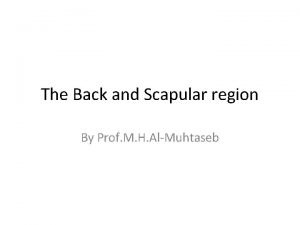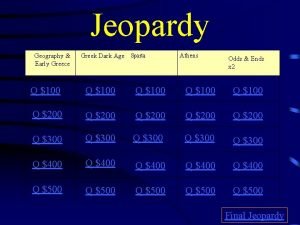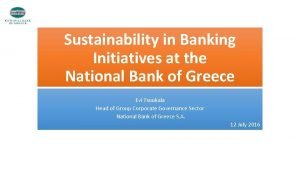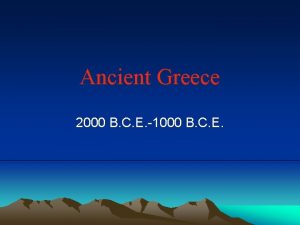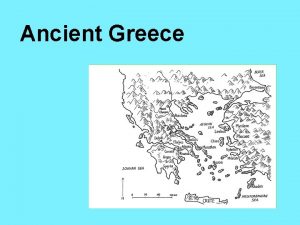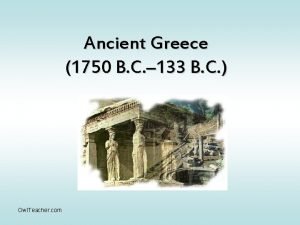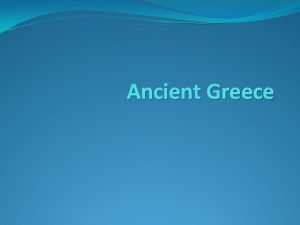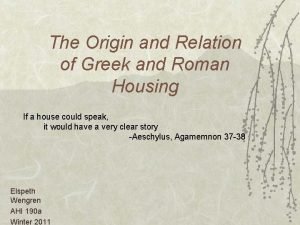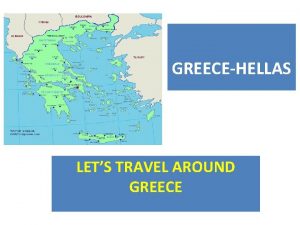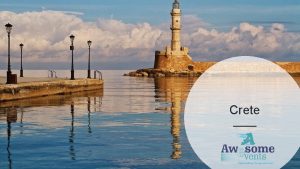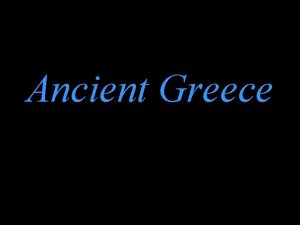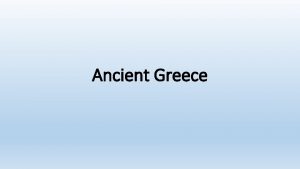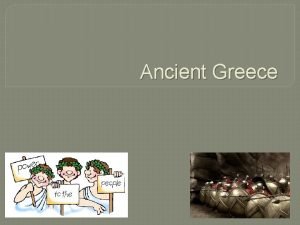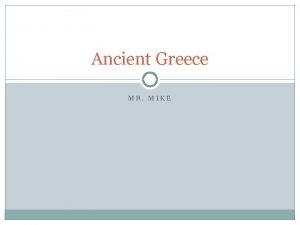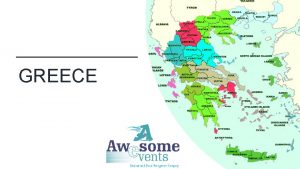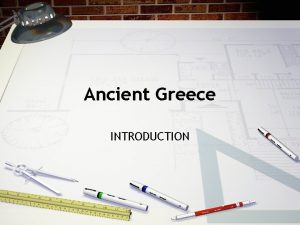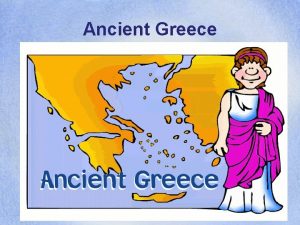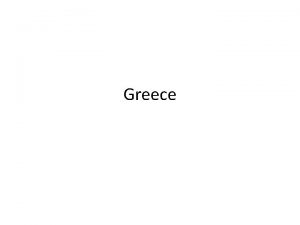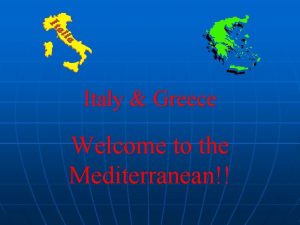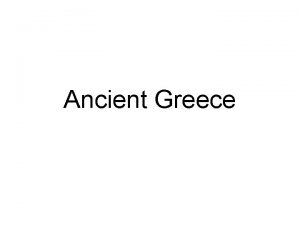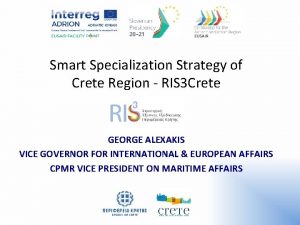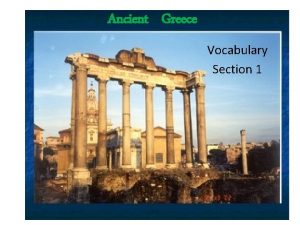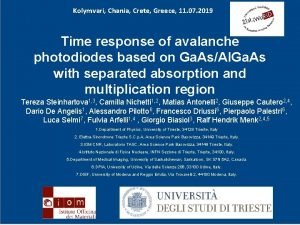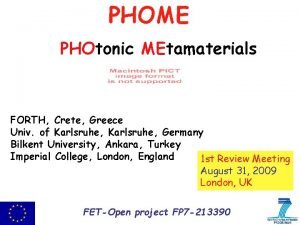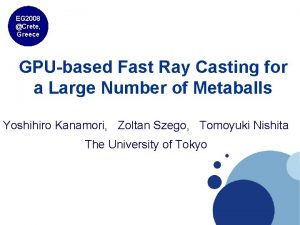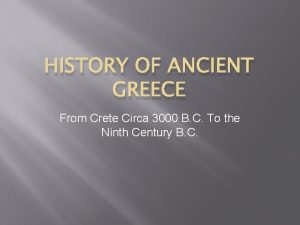Region of Crete Greece a Smart Region Region










































- Slides: 42

Region of Crete, Greece : a Smart Region

Region of Crete, Greece : Towards the Innovation

The RIS of CRETE - http: //ris 3. crete. gov. gr The Smart Specialisation Strategy of the Region of Crete embraces the vision of Crete’s developmental plan for the 2014 2020 period: Dynamic and Sustainable Crete 1. an integrated proposal for the regional economy’s exit from the crisis, aiming at enhancing the potential of innovation and scientific knowledge, in an attempt to boost the competitiveness of the well established branches and to expand the productive base of Crete towards new emerging high added value sectors. 2. a legal framework for tackling important environmental problems and challenges for Crete, in terms of sustainable development and the creation of new jobs, by enhancing the potential of innovation and scientific knowledge.

The 4 Pillars of Crete’s RIS The Agrofood Complex The Culture-Tourism Complex The Environmental Complex The Complex of Knowledge • composed of activities linked to Crete’s primary sector and in particular: rearing/growing, processing/formulation and distribution/commercialisation of agricultural products • the tourism sector (attraction, reception, hospitality, transportation, nutrition, recreation and touring • of visitors) • the cultural sector (protection enhancement and promotion of cultural resources, supporting visits to • monuments museums, interconnection of cultural resources with the society and the local economy, development of high added value international cultural activities) • the decrease in CO 2 emissions (energy saving, renewable energy applications in terms of sustainable • development), • the rational use of Crete’s natural resources, especially water resources and • the tackling of climate change consequences • research activities within the research and university institutions of Crete which could, support the development of new entrepreneurial activities in emerging sectors and expand Crete’s productive base in terms of competitiveness • education and training activities based on research and university institutions of Crete



Implementing CRETE’S RIS Funding through Crete’s Regional Operational Programme 2014 – 2020 For a Dynamic and Sustainable Crete

The Entrepreneurial Discovery Public Consultation (Environmental Complex)

The Entrepreneurial Discovery Public Consultation (Tourism-Culture Complex)

The Projects in Progress Competitive European Projects

Adaptation to Climate change Impacts on the Mediterranean islands' Agriculture The overall aim of the LIFE ADAPT 2 CLIMA project is to increase knowledge on the vulnerability of EU Mediterranean agriculture to climate change and to support decision making for adaptation planning. The methodology is based on the deployment of a set of climate, hydrological and crop simulation models for the assessment of climate change impacts on agriculture, as well as, on the development of a decision support tool for the elaboration of adaptation strategies for the agricultural sector. The project implementation area comprises of three of the largest islands of the Mediterranean Europe, the islands of Crete (Greece), Sicily (Italy) and Cyprus.

Main outputs: • Estimation of the future climate changes for the three Mediterranean islands and for the selected agricultural areas in particular • Assessment of the vulnerability of the pilot rural areas to climate change • Development, implementation and demonstration of a decision support tool (ADAPT 2 CLIMA tool) for enabling well informed decision making for adaptation planning in agriculture • Development of climate change adaptation strategies for the project implementation areas • Raising awareness of stakeholders and target groups on issues related to agriculture and climate change

NICHE: Building innovative food value chains in regions NICHE aims at increasing the adoption of research and innovation solutions by food sector companies through an open innovation approach under a quadruple helix model and new food products, services or processes.

NICHE partnership aims, by 2019 and through the improvement of existing policies, achieve an average 15 % increase in the adoption of research and innovation solutions by food sector companies in their regions, to give response to the demand of this sector identified as high potential sector for their smart growth. Project Partners: • Regional Development Agency of West Region Romania (RO) – LP • Region of Crete (GR) • Donegal County Council (IE) • Derry and Strabane District Council (UK) • Regional Council of South Ostrobothnia (FI) • Tartu Science Park (EE) • Kujawsko Pomorskie Voivodeship (PL)

EMble. Mati. C Emblematic Mediterranean Mountains as Coastal destinations of excellence General objective of the project : to qualify Emblematic Mediterranean Mountains as coastal destinations of excellence. It is directly linked to the specific objective 3. 1 “to enhance the development of a sustainable and responsible coastal and maritime tourism in the MED area”, because it brings answers in term of integrated management of coastal destinations, of sustainable development and by spreading well reasoned and concerted methods and practices

When considering more specifically the 9 destinations represented by the EMble. Mati. C project partners, the changes to implement to make the coastal tourism of the MED space more sustainable and responsible are: . • to participate to the creation of an eco touristic qualitative and differentiated offer based on the singularity of our coastal territories (emblematic dimension) and firmly guided by the respect and enhancement of human, cultural, natural and landscape heritage. • to durably evolve the tourism local policies and practices by experimenting with a new model of touristic development at the scale of the EMM network, based on well affirmed values, renewed choices (marketing lead by offer, bottom up approach, experiential dimension, slow tourism. . . ) and a long term vision. • to evolve behaviours by offering a complementary tourism experience to the seaside tourism, at the heart of the major touristic sites of the Mediterranean area.

N Partner 1 Agency for the development of the Empolese Valdelsa 2 Regional Council of Pajat-Hameen 3 University of Helsinki 4 Regional Council of Grand Est - Alsace Champagne-Ardenne Lorraine 5 University of Lorraine 6 Region of Crete 7 Government of Baranya County 8 Regional Government of Tuscany Tre. Ating contamination through Nanoremed. IAtion Country

Overall objective: improve treatment of the everincreasing number of contaminated sites in European regions, by improving design and implementation of policy measures capable of supporting uptake and diffusion of nanoremediation. Specifically: § Support R&I on identification & production of eco compatible/eco sustainable solutions for treatment of contaminated soil and water; § Exchange methodologies to evaluate effectiveness, economic sustainability and environmental safety and impact of nanoremediation, within the context of EU regulations § Provide incentives for in-situ use of NM and NP to treat contaminated soil and water; communication tools. § Raise awareness on the process of nanoremediation, its benefits and means of application. § Design and develop (Phase 1) + begin and monitor implementation (Phase 2) of Action Plans for policy improvement § Foster EU networking on nanoremediation, sharing AP guidelines through PLP and other communication tools.


• Connecting regional stakeholders in a trans regional operational framework; • Sustaining the regional stakeholders involved in circular economy activities in • Maximizing the H 2020 impact line with the Smart by supporting “circular” Specialisation of each region entrepreneurial initiatives based on the exploitation of H 2020 projects’ results.

BLUEISLANDS is a 3 year European project (2016 2019) co financed by the European Regional Development Fund and lead by the Ministry of Agriculture, Rural Development and Environment of Cyprus. The partnership consists of 14 partners, including 9 Mediterranean islands, operators, 2 research institutions and an international association specialised in resource management. The project will work on developing and elaborating effective, financially viable and environmentally responsible means to address the seasonal variation of waste generation on MED islands due to tourism.

The Mediterranean region is the world’s leading tourist destination and it is common for islands to host far greater population during the summer season. Local economies are deeply reliant on tourism for employment and income source. However, this annual massive tourist wave, largely concentrated within a short period, places a great burden on the infrastructure, especially for waste management. Indeed, local authorities are often struggling to cope with the high increase in waste generation and the often poor sorting level from tourists. The main planned tasks refer to the quantification of waste during and outside of the highly touristic period, the assessment of waste composition, the impact of litter on beaches and seashores, and their influence in waste water treatment facilities.

CLEAN Technologies and open innovation for low carbon regions Nine EU Regions A common challenge: Increase energy efficiency Innovative policy and solutions

CLEAN Technologies and open innovation for low carbon regions Use of new technology, open innovation and improved low-carbon policy instruments Increase Engagement between public energy efficiency authorities, in buildings and citizens, research public infrastructure centers and companies by 4% We have a website! Positive change of citizen energy www. interregeurope. eu/clean behaviour Follow us!

Raise Awareness and Build Skills among Civil Servants Renovation for Energy efficiency in BUilding. S Support the goals set in the EE 2020 Strategy Set Measures for Planning The Implementing Monitoring renovation works Project: Save Energy and Public Resources Efficient Renovation Works in Public Building Stock

The Partnership: www. interregeurope. eu/rebus Follow us!

The Vision of Think. NATURE We believe Nature Based Solution • can make a difference in achieving sustainable development • can address societal challenges • can be the catalyst for Urban renewal • can be a new mode of operation for innovative solutions And our aim is to create a business case that Nb. S can provide the highest value for society. The Scope of Think. NATURE The development of a multi stakeholder communication platform that will support the understanding and the promotion of nature based solutions in local, regional, EU and International levels. The Think. Nature Platform will bring together multi disciplinary scientific expertise, policy, business and society, as well as citizens and it will create a wide interactive society that builds new knowledge.

Promoting Nature Based Solutions and Innovations Nb. S Innovators and Early Adopters • Building the Nb. S Community for Cities • Trust and loyalty for Nbs • A credible business case for Nb. S • It is not only the right solution, but it also feels right


BRANDTOUR project: to improve the partners’ capacity to support tourism through the promotion, innovation and diversification of the offer. To provide better policy instruments to develop new customized tourism products that can satisfy emerging target groups, and favor inbound flows towards the EU. Through interregional cooperation the partners will develop better instruments to: enhance the visibility and market uptake of known and less known destinations; valorize attractions through better marketing, branding and communication; innovate the offer by clustering tourism SMEs and products; increase synergies between tourism private and public stakeholders; deliver more customized packages by diversifying the offer; leverage local value chains and excellence to develop thematic and experience oriented tourism.

A Roadmap for Integrating Corporate Social Responsibility (CSR) into EU Member States and Business Practices The overall objective of the project is to help EU member states to apply CSR as a holistic management approach to SMEs. In this way, SMEs will increase their competitiveness. Main outputs of the project will help countries to exchange experience, best practices and create a road map for integrating CSR into national and regional legislations and Programmes and to create national/regional actions plans. Animportant output will be the policy recommendations for the revision of the Directive 2014/95/EU, to create precedents for future policy developments on CSR and corporate accountability not only for large companies but as well for SMEs.

Main Features of the Policy Instrument in CRETE The ROAD CSR in Crete aims to: 1. Achieve the Europe 2020 targets for smart, sustainable and inclusive growth, in line with the smart specialization strategy. 2. Boost economic development and create job opportunities. 3. Promote key EU and national targets : Reinforcement of competitiveness, innovation and entrepreneurship, Sustainable development with environmental upgrade and climate change adaptations, Reinforcement of education and social cohesion in Crete, Promotion of employment and workers' adaptation to changes, Promotion of social inclusion and combating the poverty. 4. Increase the national research potential and private investments in research& innovation, to promote entrepreneurship and increase of SMEs' (Small Medium Enterprises) competitiveness. 5. Support policy learning in the field of CSR, to improve the performance of national development policies, by elaborating CSR principles into SMEs making them more competitive and sustainable.

Cooperation with Research Institutes Regional Needs for Innovative Solutions

Innovative services in the Directorate of Transport and Communications (DTC)

Introduction This project is an ongoing collaboration between ICS FORTH and the Region of Crete that aims to provide new innovative information and communications (ICT) services that will accommodate and enhance the provision of public services to citizen. Key objectives ü Efficient and effective delivery of services to citizens ü Management of resources ü Transparency improvement / fight against corruption ü Dissemination of knowledge and information Innovative services in the Directorate of Transport and Communications (DTC)

Web Portal DTC’s web portal is available to pc and mobile devices, offering a wide variety of information regarding the available administrative services (required forms and documents, prerequisites, legislation etc. ). The user can also contact the department through the available contact form. Innovative services in the Directorate of Transport and Communications (DTC)

Appointment Service Using the online appointment service, customers/citizens can schedule their visit on a particular date and time and, if necessary, fill in and electronically submit the required application forms. Upon the completion of the booking process, an e ticket is created and sent at the user’s email address. Automatic reminders are sent prior the scheduled appointment date. Innovative services in the Directorate of Transport and Communications (DTC)

Virtual Queue for citizens without a booked appointment The virtual queue operates alongside the appointment system, used by who that don’t have a booked appointment. Employees at reception desks can create and print personalized queue tickets that contain the necessary information for the customer request. Innovative services in the Directorate of Transport and Communications (DTC)

Real time Notifications Any TV or PC monitor can be turned into an information screen. Information screens display information regarding customer assignment to service desks with visual and sound announcements, estimated waiting times, as well as informative videos. A specially designed version of the notification screen is available on mobile devices in order for customers to have on the go access to the status of their queue or appointment. Innovative services in the Directorate of Transport and Communications (DTC)

Administrative and Back office Applications ü Customer Management Application for Reception and Citizen Service Desks ü Business Intelligence/Statistics Application ü System Administration ü Physical record tracking and assignment system ü Content Management System Innovative services in the Directorate of Transport and Communications (DTC)

Region of Crete, Greece : The steps forward……. SMEs Towards: : Public Sector Research Citizens www. crete. gov. gr www. incrediblecrete. gr http: //ris 3. crete. gov. gr

q References for Crete’s Registrations to Smart Regions 2 Conference: Dr N Raptakis, n. raptakis@crete. gov. gr (Registered) Executive Secretary of the Region of Crete Dr E Hatziyanni, elhatziyanni@crete. gov. gr (Registered exhibitor on behalf of the Region of Crete) Appointed for EU Projects Coordination in terms of RIS Implementation, EU Projects L. E. A. R. Director of Environment and Spatial Planning q Contacts for projects presented: ADAPT 2 CLIMA (Dr E Hatziyanni, elhatziyanni@crete. gov. gr) BLUEISLANDS (E Kargaki, lena. kargakis@gmail. com) BRANDTOUR (Dr E Hatziyanni, elhatziyanni@crete. gov. gr) CLEAN (M Apostolaki, maria. apostolaki@gmail. com) Dir Transport Communications ICT services (Dr N Raptakis, n. raptakis@crete. gov. gr) EMble. Mati. C, (Ch Piteris , piteris@crete. gov. gr) NICHE (Ev Vrontaki, evrontaki@crete. gov. gr) REBUS (M Apostolaki, maria. apostolaki@gmail. com) ROAD_CSR (Dr K Vlasaki, avlasaki@crete. gov. gr) SCREEN (Dr E Hatziyanni, elhatziyanni@crete. gov. gr) TANIA (K Georgitzikis, georgitzikis@crete. gov. gr) THINK_NATURE (Dr E Hatziyanni, elhatziyanni@crete. gov. gr) q. RIS Governance and Information: Chr Daskalaki, , hdaskalaki@crete. gov. gr Director of Development Planning, Coordinator of RIS Governance WGs St Kaukakis (kaukakis@crete. gov. gr) Responsible for RIS Web. Site, http: //ris 3. crete. gov. gr/
 Balkan peninsula map ancient greece
Balkan peninsula map ancient greece Brachio radial
Brachio radial Crete security
Crete security Forth crete
Forth crete Crete sylvienne
Crete sylvienne Smart region
Smart region Lived on the island of crete
Lived on the island of crete Crtes
Crtes Palatin
Palatin Crête orbito nasale
Crête orbito nasale Mandibules humain
Mandibules humain Ventilation artificielle
Ventilation artificielle Trigone palatin
Trigone palatin Dalawang paraan sa pagtukoy sa lokasyon sa pilipinas
Dalawang paraan sa pagtukoy sa lokasyon sa pilipinas Crête de duret échographie
Crête de duret échographie It's not how smart you are it's how you are smart meaning
It's not how smart you are it's how you are smart meaning Street smart vs book smart quotes
Street smart vs book smart quotes Future smart smart shopping answers
Future smart smart shopping answers One smart man he felt smart
One smart man he felt smart Street knowledge vs book knowledge
Street knowledge vs book knowledge It's not how smart you are
It's not how smart you are Smart two men are
Smart two men are Gestalt
Gestalt Active region and saturation region
Active region and saturation region Intermuscular spaces
Intermuscular spaces Ancient greece jeopardy
Ancient greece jeopardy Quantitative frq ap gov examples
Quantitative frq ap gov examples Country and capital
Country and capital Guest inn greece
Guest inn greece Aristocrats in ancient greece
Aristocrats in ancient greece The glory of athens
The glory of athens Map of greece
Map of greece Ebanking national bank of greece
Ebanking national bank of greece Greece 2000 bc
Greece 2000 bc Physical geography greece
Physical geography greece Ancient greece 1750 b.c-133 b.c answers
Ancient greece 1750 b.c-133 b.c answers Pergamon greece
Pergamon greece 776 bc first olympic games
776 bc first olympic games Greek tragedy masks
Greek tragedy masks Peristyle
Peristyle The capital and largest city of greece
The capital and largest city of greece Greek golden age
Greek golden age Where did civilization start
Where did civilization start

